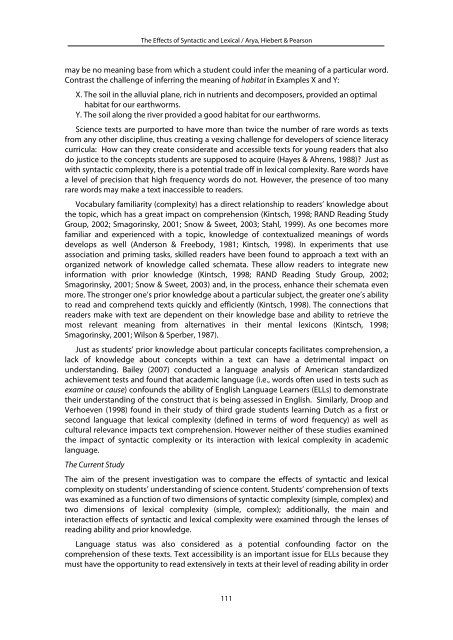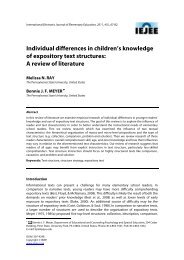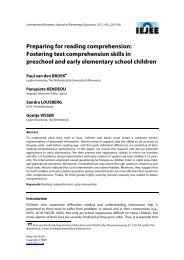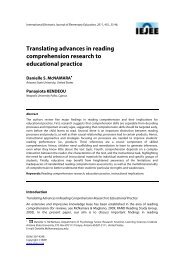The effects of syntactic and lexical complexity on the comprehension ...
The effects of syntactic and lexical complexity on the comprehension ...
The effects of syntactic and lexical complexity on the comprehension ...
Create successful ePaper yourself
Turn your PDF publications into a flip-book with our unique Google optimized e-Paper software.
<str<strong>on</strong>g>The</str<strong>on</strong>g> Effects <str<strong>on</strong>g>of</str<strong>on</strong>g> Syntactic <str<strong>on</strong>g>and</str<strong>on</strong>g> Lexical / Arya, Hiebert & Pears<strong>on</strong>may be no meaning base from which a student could infer <strong>the</strong> meaning <str<strong>on</strong>g>of</str<strong>on</strong>g> a particular word.C<strong>on</strong>trast <strong>the</strong> challenge <str<strong>on</strong>g>of</str<strong>on</strong>g> inferring <strong>the</strong> meaning <str<strong>on</strong>g>of</str<strong>on</strong>g> habitat in Examples X <str<strong>on</strong>g>and</str<strong>on</strong>g> Y:X. <str<strong>on</strong>g>The</str<strong>on</strong>g> soil in <strong>the</strong> alluvial plane, rich in nutrients <str<strong>on</strong>g>and</str<strong>on</strong>g> decomposers, provided an optimalhabitat for our earthworms.Y. <str<strong>on</strong>g>The</str<strong>on</strong>g> soil al<strong>on</strong>g <strong>the</strong> river provided a good habitat for our earthworms.Science texts are purported to have more than twice <strong>the</strong> number <str<strong>on</strong>g>of</str<strong>on</strong>g> rare words as textsfrom any o<strong>the</strong>r discipline, thus creating a vexing challenge for developers <str<strong>on</strong>g>of</str<strong>on</strong>g> science literacycurricula: How can <strong>the</strong>y create c<strong>on</strong>siderate <str<strong>on</strong>g>and</str<strong>on</strong>g> accessible texts for young readers that alsodo justice to <strong>the</strong> c<strong>on</strong>cepts students are supposed to acquire (Hayes & Ahrens, 1988)? Just aswith <str<strong>on</strong>g>syntactic</str<strong>on</strong>g> <str<strong>on</strong>g>complexity</str<strong>on</strong>g>, <strong>the</strong>re is a potential trade <str<strong>on</strong>g>of</str<strong>on</strong>g>f in <str<strong>on</strong>g>lexical</str<strong>on</strong>g> <str<strong>on</strong>g>complexity</str<strong>on</strong>g>. Rare words havea level <str<strong>on</strong>g>of</str<strong>on</strong>g> precisi<strong>on</strong> that high frequency words do not. However, <strong>the</strong> presence <str<strong>on</strong>g>of</str<strong>on</strong>g> too manyrare words may make a text inaccessible to readers.Vocabulary familiarity (<str<strong>on</strong>g>complexity</str<strong>on</strong>g>) has a direct relati<strong>on</strong>ship to readers’ knowledge about<strong>the</strong> topic, which has a great impact <strong>on</strong> comprehensi<strong>on</strong> (Kintsch, 1998; RAND Reading StudyGroup, 2002; Smagorinsky, 2001; Snow & Sweet, 2003; Stahl, 1999). As <strong>on</strong>e becomes morefamiliar <str<strong>on</strong>g>and</str<strong>on</strong>g> experienced with a topic, knowledge <str<strong>on</strong>g>of</str<strong>on</strong>g> c<strong>on</strong>textualized meanings <str<strong>on</strong>g>of</str<strong>on</strong>g> wordsdevelops as well (Anders<strong>on</strong> & Freebody, 1981; Kintsch, 1998). In experiments that useassociati<strong>on</strong> <str<strong>on</strong>g>and</str<strong>on</strong>g> priming tasks, skilled readers have been found to approach a text with anorganized network <str<strong>on</strong>g>of</str<strong>on</strong>g> knowledge called schemata. <str<strong>on</strong>g>The</str<strong>on</strong>g>se allow readers to integrate newinformati<strong>on</strong> with prior knowledge (Kintsch, 1998; RAND Reading Study Group, 2002;Smagorinsky, 2001; Snow & Sweet, 2003) <str<strong>on</strong>g>and</str<strong>on</strong>g>, in <strong>the</strong> process, enhance <strong>the</strong>ir schemata evenmore. <str<strong>on</strong>g>The</str<strong>on</strong>g> str<strong>on</strong>ger <strong>on</strong>e’s prior knowledge about a particular subject, <strong>the</strong> greater <strong>on</strong>e’s abilityto read <str<strong>on</strong>g>and</str<strong>on</strong>g> comprehend texts quickly <str<strong>on</strong>g>and</str<strong>on</strong>g> efficiently (Kintsch, 1998). <str<strong>on</strong>g>The</str<strong>on</strong>g> c<strong>on</strong>necti<strong>on</strong>s thatreaders make with text are dependent <strong>on</strong> <strong>the</strong>ir knowledge base <str<strong>on</strong>g>and</str<strong>on</strong>g> ability to retrieve <strong>the</strong>most relevant meaning from alternatives in <strong>the</strong>ir mental lexic<strong>on</strong>s (Kintsch, 1998;Smagorinsky, 2001; Wils<strong>on</strong> & Sperber, 1987).Just as students’ prior knowledge about particular c<strong>on</strong>cepts facilitates comprehensi<strong>on</strong>, alack <str<strong>on</strong>g>of</str<strong>on</strong>g> knowledge about c<strong>on</strong>cepts within a text can have a detrimental impact <strong>on</strong>underst<str<strong>on</strong>g>and</str<strong>on</strong>g>ing. Bailey (2007) c<strong>on</strong>ducted a language analysis <str<strong>on</strong>g>of</str<strong>on</strong>g> American st<str<strong>on</strong>g>and</str<strong>on</strong>g>ardizedachievement tests <str<strong>on</strong>g>and</str<strong>on</strong>g> found that academic language (i.e., words <str<strong>on</strong>g>of</str<strong>on</strong>g>ten used in tests such asexamine or cause) c<strong>on</strong>founds <strong>the</strong> ability <str<strong>on</strong>g>of</str<strong>on</strong>g> English Language Learners (ELLs) to dem<strong>on</strong>strate<strong>the</strong>ir underst<str<strong>on</strong>g>and</str<strong>on</strong>g>ing <str<strong>on</strong>g>of</str<strong>on</strong>g> <strong>the</strong> c<strong>on</strong>struct that is being assessed in English. Similarly, Droop <str<strong>on</strong>g>and</str<strong>on</strong>g>Verhoeven (1998) found in <strong>the</strong>ir study <str<strong>on</strong>g>of</str<strong>on</strong>g> third grade students learning Dutch as a first orsec<strong>on</strong>d language that <str<strong>on</strong>g>lexical</str<strong>on</strong>g> <str<strong>on</strong>g>complexity</str<strong>on</strong>g> (defined in terms <str<strong>on</strong>g>of</str<strong>on</strong>g> word frequency) as well ascultural relevance impacts text comprehensi<strong>on</strong>. However nei<strong>the</strong>r <str<strong>on</strong>g>of</str<strong>on</strong>g> <strong>the</strong>se studies examined<strong>the</strong> impact <str<strong>on</strong>g>of</str<strong>on</strong>g> <str<strong>on</strong>g>syntactic</str<strong>on</strong>g> <str<strong>on</strong>g>complexity</str<strong>on</strong>g> or its interacti<strong>on</strong> with <str<strong>on</strong>g>lexical</str<strong>on</strong>g> <str<strong>on</strong>g>complexity</str<strong>on</strong>g> in academiclanguage.<str<strong>on</strong>g>The</str<strong>on</strong>g> Current Study<str<strong>on</strong>g>The</str<strong>on</strong>g> aim <str<strong>on</strong>g>of</str<strong>on</strong>g> <strong>the</strong> present investigati<strong>on</strong> was to compare <strong>the</strong> <str<strong>on</strong>g>effects</str<strong>on</strong>g> <str<strong>on</strong>g>of</str<strong>on</strong>g> <str<strong>on</strong>g>syntactic</str<strong>on</strong>g> <str<strong>on</strong>g>and</str<strong>on</strong>g> <str<strong>on</strong>g>lexical</str<strong>on</strong>g><str<strong>on</strong>g>complexity</str<strong>on</strong>g> <strong>on</strong> students’ underst<str<strong>on</strong>g>and</str<strong>on</strong>g>ing <str<strong>on</strong>g>of</str<strong>on</strong>g> science c<strong>on</strong>tent. Students’ comprehensi<strong>on</strong> <str<strong>on</strong>g>of</str<strong>on</strong>g> textswas examined as a functi<strong>on</strong> <str<strong>on</strong>g>of</str<strong>on</strong>g> two dimensi<strong>on</strong>s <str<strong>on</strong>g>of</str<strong>on</strong>g> <str<strong>on</strong>g>syntactic</str<strong>on</strong>g> <str<strong>on</strong>g>complexity</str<strong>on</strong>g> (simple, complex) <str<strong>on</strong>g>and</str<strong>on</strong>g>two dimensi<strong>on</strong>s <str<strong>on</strong>g>of</str<strong>on</strong>g> <str<strong>on</strong>g>lexical</str<strong>on</strong>g> <str<strong>on</strong>g>complexity</str<strong>on</strong>g> (simple, complex); additi<strong>on</strong>ally, <strong>the</strong> main <str<strong>on</strong>g>and</str<strong>on</strong>g>interacti<strong>on</strong> <str<strong>on</strong>g>effects</str<strong>on</strong>g> <str<strong>on</strong>g>of</str<strong>on</strong>g> <str<strong>on</strong>g>syntactic</str<strong>on</strong>g> <str<strong>on</strong>g>and</str<strong>on</strong>g> <str<strong>on</strong>g>lexical</str<strong>on</strong>g> <str<strong>on</strong>g>complexity</str<strong>on</strong>g> were examined through <strong>the</strong> lenses <str<strong>on</strong>g>of</str<strong>on</strong>g>reading ability <str<strong>on</strong>g>and</str<strong>on</strong>g> prior knowledge.Language status was also c<strong>on</strong>sidered as a potential c<strong>on</strong>founding factor <strong>on</strong> <strong>the</strong>comprehensi<strong>on</strong> <str<strong>on</strong>g>of</str<strong>on</strong>g> <strong>the</strong>se texts. Text accessibility is an important issue for ELLs because <strong>the</strong>ymust have <strong>the</strong> opportunity to read extensively in texts at <strong>the</strong>ir level <str<strong>on</strong>g>of</str<strong>on</strong>g> reading ability in order111





